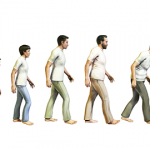Worse yet, maybe we don’t want to think of the elderly. In general, we love to reminisce about our past as we long for our youth. We look back to our golden years, while dreading the onset of silver hair. Taking care of patients who are afflicted by geriatric syndromes is a profound reminder of our own mortality. Recognizing their frailty can bring us closer to acknowledging our own frailty. Maybe that’s why we are so reluctant to talk honestly about aging and why, among the different types of isms, ageism appears to be forever in the background.
As you can imagine, combating ageism requires recognizing its looming presence within ourselves and dragging those deeply held assumptions from the background to the foreground. That means challenging knee-jerk habits that are expressed within our language, such as jokes and idioms and witticisms. It means honoring the life experiences of our older patients and seeing them as full people, not merely caricatures we see on television or in movies. And it also means that we acknowledge that one day we will be old ourselves and that we need to pioneer better treatment for the elderly before we end up in their shoes.
Power Disparities
It is fair to say that most of us seek to make the rheumatology clinic an egalitarian space, where patients feel comfortable disclosing their health concerns and clinicians feel comfortable providing potential solutions. Regrettably, the reality is that we are far from that ideal.
A power differential exists, one marked by the stethoscope and the white coat, access to the electronic medical record and the healthcare organization’s ability to dictate the pace and structure of the visit. Due to this power differential, our words carry enormous weight, which is exactly why we must use them with utmost precision.
Even casual remarks can have unexpected consequences. A well-meaning joke about aging may be appropriate among friends, but, in the context of a clinician providing care to a patient, it may come off as minimizing or dismissive. This is especially true when discussing chronic conditions that intersect with complex dimensions of identity, function and autonomy. Words matter, and, because of these power differentials, the impact of our words may not reflect our intent.
Complicating matters is that there is no true list of preferred words or words to avoid. More important is the sentiment carried by each word. That is why it is critical to strike the right balance between authenticity and sensitivity. We want to be personable, spontaneous and relatable because that is how we see an egalitarian relationship, but in our clinic spaces, this natural drive cannot come at the expense of respect. Being mindful of how our words land, especially across lines of age, requires self-awareness and humility. Listening is certainly an important part of developing that self-awareness and humility, but it is only the beginning of how we can address ageism.


